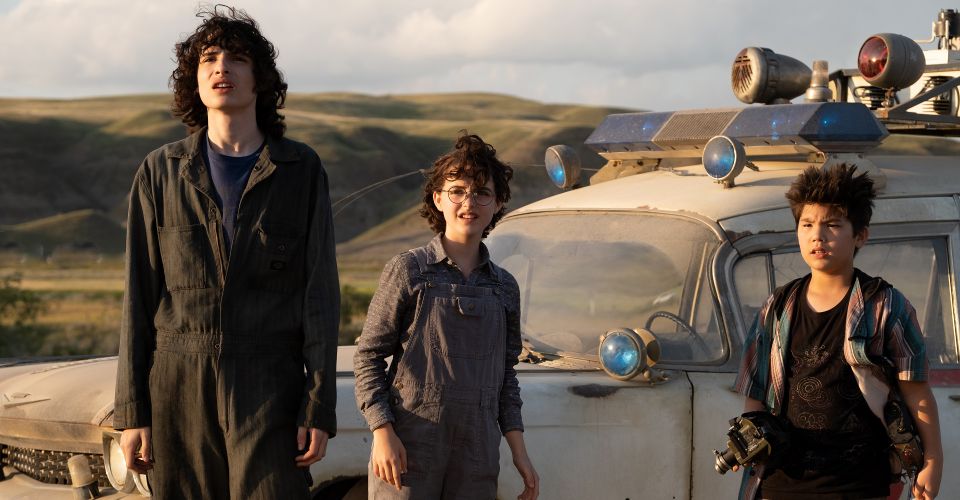Ghostbusters: Afterlife Review – A Charmless Sequel That Lacks All Of The Fun

Hollywood is hesitant to let go of the Ghostbusters franchise, but Ghostbusters: Afterlife is a reminder that some things should stay in the past instead of being resurrected. The sequel relies too heavily on nostalgia and action without any of the goofy light-heartedness that made 1984’s Ghostbusters memorable to begin with. Directed by Jason Reitman, who revives the franchise from the original’s director and father Ivan Reitman, Ghostbusters: Afterlife is inoffensive family-friendly entertainment, but it doesn’t have any soul, charisma, or good drama to justify its existence.
Callie (Carrie Coon) is struggling financially, but decides to leave her old life behind and packs up her two kids — Phoebe (McKenna Grace) and Trevor (Finn Wolfhard) — and moves to Summerville, Oklahoma after her father, Egon Spengler, dies. Having been estranged from her father, Callie was surprised he’d left her a dirt farm. While there doesn’t seem to be anything to it but junk and dirt, Phoebe, alongside new friend Podcast (Logan Kim) and summer school teacher/seismologist Gary Grooberson (Paul Rudd), discovers Egon was preparing for something sinister to plague Earth. When Phoebe learns her grandfather was a ghostbuster, she follows in his footsteps to stop a catastrophic event from erupting beneath Summerville.

Ghostbusters: Afterlife combines elements from the Ghostbusters video game and the original movie to bring the story full circle, but by paying homage to the original, it loses itself in the process. The film itself will likely play well with younger audiences; it’s very family-friendly, but there is also very little heart to the proceedings because Afterlife lacks any emotional stakes. There is some tension between Phoebe and Callie, but it’s lackluster at best. Phoebe’s entire characterization also falls into the “good at science” trap that renders her knowledgeable about everything related to science, even when it doesn’t make much sense for someone her age (no matter how many books she’s read). It’s the same thing that happens with tech-smart characters who can suddenly hack and figure their way out of every kind of computer system, satellite, etc.
Reitman and co-writer Gil Kenan have an infatuation with lineage and its connection to legacy, with Ghostbusters: Afterlife latching onto the idea that the only people who could save the world from the apocalypse are the grandchildren of an original ghostbuster. The way Reitman also uses the late Harold Ramis is especially disrespectful and disingenuous, an attempt to pull at the heart strings and bring the story together that essentially falls flat. The decision to bring back the villain from 1984’s Ghostbusters is lazy and contrived; the characters could have taken on an entirely new villain, but Afterlife chooses to recycle an old storyline just for the sake of nostalgia.

Considering how the film will likely play well for younger audiences, the nostalgia factor isn’t even necessary for the story to work. Parts of it do, and there is a lot of potential the film wastes regurgitating what has already been done. Ghostbusters: Afterlife had the opportunity to be charming and goofy, traits that made the original film and its sequel memorable, but it squanders it, taking itself far too seriously and therefore sucking the joy and charisma out of the story. Even the jokes, which are meant to be awkward because they’re science-related (and it’s unclear why liking science is meant to be weird here) don’t work despite being occasionally funny. Ghostbusters: Afterlife needed a whole lot more of Paul Rudd and Carrie Coon, too, who are so heavily underutilized that one might wonder why they would bring in actors of their caliber to do very little.
Ghostbusters: Afterlife is so occupied with its action that it forgoes all of the fun. The overall lack of energy stalls the pacing and the story could have used a lot more creativity. The film relies too heavily on the original to stand out on its own and therefore fails at crafting its own personality. There are elements that work — namely, the friendship between Phoebe and Podcast — but the story often trudges along as though it has to, leaving behind any passion and zeal for a more serious approach that just doesn’t fit into the core of Ghostbusters. With an underwhelming story and zero charm, Afterlife doesn’t really know what it wants to be and it only serves as a reminder of how lighthearted and entertaining the 1984 film was in comparison.
Ghostbusters: Afterlifereleased to theaters on November 19, 2021. The film is 124 minutes long and is rated PG-13 for supernatural action and some suggestive language.
- Ghostbusters: Afterlife (2021)Release date: Nov 19, 2021
About The Author


















